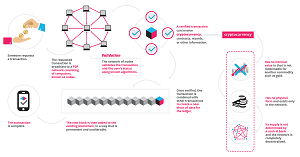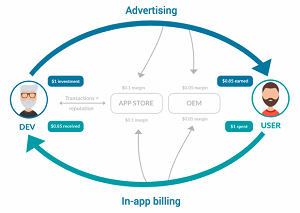News
New Tool for Mobile App Development in 2019: Blockchain
- By David Ramel
- January 14, 2019
Blockchain technology is most associated with cryptographic currencies, but all signs point toward it becoming an important tool in the mobile developer's arsenal in the new year.
One description of the mysterious technology (from the book "Blockchain Revolution") is: "The blockchain is an incorruptible digital ledger of economic transactions that can be programmed to record not just financial transactions but virtually everything of value."
With such potential widespread functionality, blockchain is increasing being used for mobile development. But how exactly?
"Any organization or business that requires recording and/or sharing of digital data through their app can benefit from implementing blockchain in their mobile apps," said dev company ChromeInfotech in a November post.
A post by eLearning Industry provides more info, including the types of apps most suitable for an infusion of blockchain. "As mobile transactions are getting momentum for many businesses, blockchain-based mobile apps are increasingly getting popular," said the site.
 [Click on image for larger view.]
A Blockchain Transaction (source: Blockgeeks)
[Click on image for larger view.]
A Blockchain Transaction (source: Blockgeeks)
Its list of common types of blockchain-based apps is dominated by cryptocurrency concerns, but also includes others:
- An app for exchanging cryptocurrencies can make things easier for asset traders and miners. Like stock market apps, such cryptocurrency apps allow you to have total control over your digital assets and trade with them. Cryptocurrencies that are powered by blockchain can be used for all sorts of payment and transactions through such apps.
- Electronic wallet apps that can store your digital assets and money and allow you to spend on transactions involve blockchain technology.
- There can also be digital asset tracker apps to provide you updated information about the rates, cryptocurrency trades, market dynamics and a portfolio of various cryptocurrencies.
- Retail apps allowing its customers to pay through bitcoin or other based cryptocurrencies is another type of blockchain-based app.
- Smart contract or self-executable protocols that respond automatically to some predetermined triggers is another facet of blockchain that can be used in mobile apps for driving automation.
Topcoder, a crowdsourcing development specialist, also examined the topic of using blockchain in mobile app development.
"Blockchain is a very buzzy term in tech," Topcoder said. "While many are adopting it for a variety of scenarios, is it right for mobile app development? There are pros and cons to designing applications with it. It's often touted for its security because a blockchain cannot be corrupted and is always transparent. These traits bring both opportunity and challenges."
Topcoder also explored the use cases for blockchain beyond cryptocurrencies like bitcoin.
"While it's mostly discussed in the context of bitcoin and transaction records, it has many more uses," the firm said. "Blockchain technology does something that other structures cannot. It allows digital information to be distributed, but not copied. It's the architecture for a new kind of internet. Beyond just a backbone for bitcoin, blockchain development has many uses in the tech world.
"With a decentralized app, there is no single authority accountable for the storage, management, and organization of the data. Everything is stored on blocks, which are then distributed on a ledger, ensuring traceability, transparency, and the inability to alter it. It operates autonomously. However, since there is not a single owner, changes are made by the consensus of all stakeholders."
In its discussion, Topcoder notes the pros and cons of distributed databases -- another blockchain implementation -- quality assurance concerns and more. But, again, cryptocurrency is still the No. 1 use case.
"You'll find that the more your app is like bitcoin, the more likely a blockchain architecture makes sense," Topcoder said. "Study the details if you aren't intimately familiar with bitcoin, but don't assume that bitcoin is the only way to use a blockchain. Possibilities await for those businesses that want to take advantage of the technology and all that it offers."
One possibility beyond the nuts and bolts of actual mobile app development is the app store itself, and not just the traditional Google Play and Apple's App Store. HealthcareITNews discusses just such a specialized niche implementation in a recent article that reports on a blockchain-based app store that connects AI developers, providers and imaging centers in the medical field.
But blockchain might be used to shake up those primary app stores also, says the site CoinTelegraph in the article titled "App Stores of Future Will Be Based on Blockchain, Promote Transparency." Reporting on app store plans from the firm AppCoin, the article says, "Google Play and the Apple App Store are the most widely used mobile marketplaces across the globe. It's because of this duopoly that they are able to impose a 30 percent cut on all purchases, app downloads and in-app items alike.
"AppCoin wants to change this by utilizing Blockchain technology, disrupting the traditional app economy. This economy is worth nearly $77 bln today and may double by 2020."
The app store issue is also addressed by NUS Enterprise in a post titled "Blockchain technology: is the app store business ready to be disrupted?"
 [Click on image for larger view.]
Addressing Inefficiencies (source: NUS Enterprise)
[Click on image for larger view.]
Addressing Inefficiencies (source: NUS Enterprise)
Among other functionality, the post says blockchain technology can be used to reduce inefficiencies in advertising, in-app billing and app approval.
"In our opinion, blockchain technology is a tool that will undoubtedly help all sorts of markets and services become open, decentralized and free of monopolies," said the post. "Our contribution to the app market uses blockchain to create a new, more clear and fair space where developers, manufacturers and OEMs can truly be rewarded and benefit from the app economy, as well as to give users more incentives to invest, use and spent resources on the market." The firm provides the AppCoins Protocol, which it says is the first open source blockchain-based protocol.
And there are more use cases to explore. For another example, "Using blockchain, the identities of people can be verified when they use services like getting a driving license or opening a new bank account," said a post by Startup Grind. "This will enable people to use a mobile app network and verify their identity using blockchain."
However, leveraging the technology can be a challenge.
"It is not a very easy task to incorporate blockchain technology in the mobile app development project, and it is still harder to make them secure," the site says. "Skilled mobile app developers who are well-versed with blockchain app development are still lacking in the industry. Thus, it is very important to set up the right standards and use the right tools for encouraging more developers to enter the field."
The site provides the following tips for developing mobile apps with blockchain:
- The purpose and usefulness of blockchain for a particular business should be well-known. It's best suited for apps that demand transparency, trust and accountability throughout the network.
- Blockchain open source should be utilized to the maximum. Examples include OpenChain, MultiChain, HydraChain, Eris, BigChainDB, Hyperledger, Stellar and more.
- Developers should stay updated and maintain the relevance of technology. Developers should constantly upgrade their skills as new technologies evolve, learn and train and be active on social media and in other discussions.
DevOps.com also provides similar guidance in an
article titled "5 Tips for Creating Blockchain iOS and Android Apps."
That article explains developers should:
- Focus on the interface. That includes answering questions such as: s the front-end programming language operational? Is the blockchain application that is necessary for operating this language included? Has the developer considered the importance of an external database? Is the right application control being included during the development process?
- Take a closer look at the importance of architecture. "If a blockchain app is being created to be used on an iPhone or Android device, developers must take a closer look at the design architecture so that they can avoid common mistakes. Unfortunately, many aspects aren't always considered, and they often involve additional processes that can add extra time to the process."
- Ensure proper platform utilization. Choices include Ethereum, Quorum or others. "Now that more platforms are openly sourced, this makes life much easier -- developers have the chance to select the platform that best aligns with all of their needs and desires."
- Recognize the importance of consensus mechanisms. "Without decentralization and a consensus mechanism, many of the typical problems and issues that arise are not as easy to solve. The system used to connect and provide a link needs a proper consensus. Without a consensus mechanism, the system's ability to carry out all of the necessary tasks is severely compromised."
- Identify objectives. This involves answering questions such as: What is the goal they are trying to accomplish by creating this app? What role is blockchain technology going to play? Are all of the necessary blockchain development principles being adhered to? Is the issue that is going to be solved being made perfectly clear?
Of course, with the much-publicized lack of specialized software development talent, some enterprises might be looking to the growing number of third-party blockchain-based development shops. One example is Fueled, which describes itself as "builders of all things blockchain" and a specialist in distributed apps, which it terms dApps.
"Thanks to a growing inventory of open-source and third-party APIs for blockchain development, the dApp development process has become faster and easier than ever," the firm's site says. "We build our dApps to ensure that our service APIs are always in communication with your Ethereum network." Fueled and other blockchain development specialists -- along with other related resources -- are examined in the BusinessofApps marketplace here.
Whatever route organizations take toward furthering their 2019 mobile development initiatives with blockchain technology, the space is bound to get more interesting this year and in the immediate future.
For example, research firm IDC predicted worldwide blockchain spending will grow to $9.7 billion in 2021 with a five-year compound annual growth rate (CAGR) of 81.2 percent.
"Interest and investment in blockchain and distributed ledger technology (DLT) is accelerating as enterprises aggregate data into secure, sequential, and immutable blockchain ledgers, transforming their businesses and operations," said Bill Fearnley, Jr., research director, Worldwide Blockchain Strategies. "Many technology vendors and service providers are collaborating and working with consortiums such as the Enterprise Ethereum Alliance and the Hyperledger Projects to develop innovative solutions that improve processes such as post-trade processing, tracking and tracing shipments in the supply chain, and transaction records for auditing and compliance. Also, multiple regulators and central banks have made positive comments about blockchain and DLT and this will help to accelerate demand in regulated industries such as financial services and healthcare."
Also, the technology has development implications beyond the mobile space, as LinkedIn just last week reported that "blockchain developer" topped its list of emerging jobs going into 2019.
"Only time will tell if blockchain will be a long-standing trend in the job market," LinkedIn Chief Economist Guy Berger said.